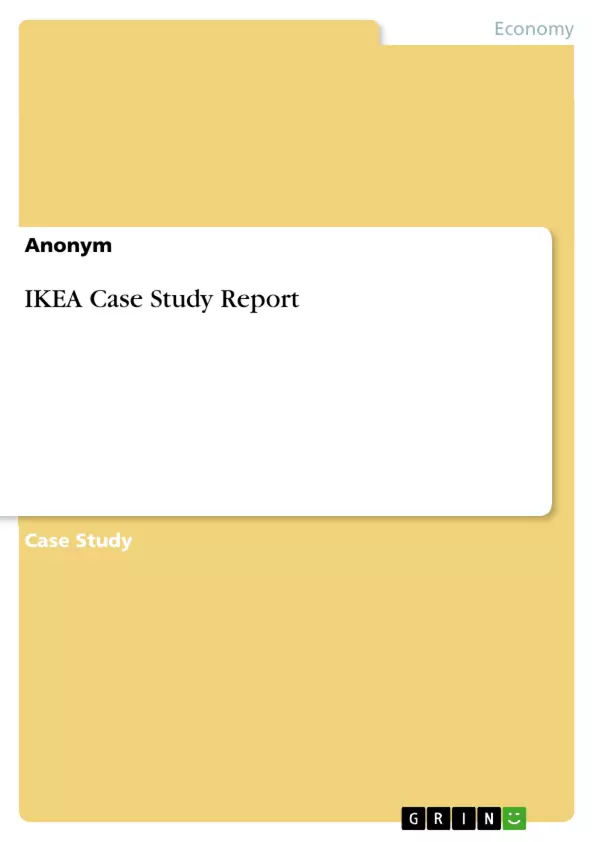Multinational corporations (MNCs) are able to review the world's tax legislation and take advantage of the loopholes and anomalies in the tax legislation of the various nations, thus avoiding the payment of billions of dollars in taxes.
Based on the case of IKEA Group, both tax evasion and tax avoidance are unethical when elements such as social inequality, undermining of tax compliance, unfairness in competition between different firms, violation of social contracts between corporations and host communities, and erosion of tax revenues for society are present.
IKEA's practices are unethical from a consequentialist ethical standpoint due to the negative effects of their practices on society, as well as from a deontological standpoint due to their failure to respect not only the letter and spirit of the law, but also the rights of communities, competitors, nations, individual taxpayers, and other stakeholders.
Tax evasion and avoidance significantly contribute to the undermining of the compliance culture as they undermine the tax system’s integrity, thus leading to weaker compliance. The evaluation of the actions and measures that HMRC apply for tax compliance in light of the ethical issues of tax avoidance and evasion indicates that the approaches would lead to great successes in the reduction of tax avoidance and evasion.
Table of Contents
- Executive Summary
- Introduction
- Analysis of the Ethical Issues Surrounding Tax Avoidance and Tax Evasion
- Evaluation of the Actions and Measures That HMRC Apply for Tax Compliance
- Conclusion
- Recommendations
- References
Objectives and Key Themes
This case study aims to analyze the ethical implications of tax avoidance and evasion by multinational corporations (MNCs), using IKEA as a case study. The study examines the ethical implications of IKEA's tax practices in the context of international tax legislation and the impact on society, tax compliance, and fair competition.
- Ethical considerations surrounding tax avoidance and tax evasion by MNCs
- Impact of tax avoidance on social inequality, tax compliance, and fair competition
- Analysis of IKEA's tax practices from a consequentialist and deontological ethical perspective
- Evaluation of HMRC's actions and measures for tax compliance in the context of ethical issues
- The role of tax legislation and its loopholes in facilitating tax avoidance
Chapter Summaries
- Executive Summary: Briefly outlines the main ethical issues surrounding IKEA's tax avoidance practices, highlighting the negative consequences for society, tax compliance, and fair competition.
- Introduction: Provides a historical context for tax avoidance, discussing its evolution from individual practices to corporate strategies, particularly in the context of globalization and the global financial crisis. The introduction highlights the increased scrutiny of MNC tax practices by international institutions and tax authorities.
- Analysis of the Ethical Issues Surrounding Tax Avoidance and Tax Evasion: Examines various perspectives on the ethicality of tax avoidance and evasion, referencing relevant academic literature and outlining the arguments of scholars like Prebble and Prebble (2010) and Doyle et al. (2009). This chapter further explores the definitions of tax evasion and avoidance, emphasizing the complexities and challenges in distinguishing between them.
Keywords
This case study focuses on the ethical dimensions of tax avoidance and evasion by multinational corporations. Key concepts include social inequality, tax compliance, fair competition, violation of social contracts, erosion of tax revenues, consequentialist ethics, deontological ethics, and HMRC's tax compliance measures.
Frequently Asked Questions
What is the difference between tax evasion and tax avoidance?
Tax evasion is the illegal non-payment of taxes, while tax avoidance involves using legal loopholes and anomalies in legislation to reduce tax liability.
Why is IKEA's tax strategy considered unethical by some scholars?
It is viewed as unethical because it undermines tax compliance, creates unfair competition, and erodes tax revenues necessary for public services and social equality.
What is the deontological perspective on corporate tax avoidance?
From a deontological standpoint, corporations have a moral duty to respect the spirit of the law and the social contract with the communities where they operate, regardless of legal technicalities.
How do multinational corporations exploit tax loopholes?
They review global tax legislation and shift profits to low-tax jurisdictions through complex internal structures and transfer pricing.
What measures does HMRC apply to ensure tax compliance?
HMRC uses various regulatory actions and compliance measures aimed at reducing the gap caused by aggressive tax planning and ensuring corporations contribute fairly.
- Citation du texte
- Anonym (Auteur), 2022, IKEA Case Study Report, Munich, GRIN Verlag, https://www.grin.com/document/1306565



